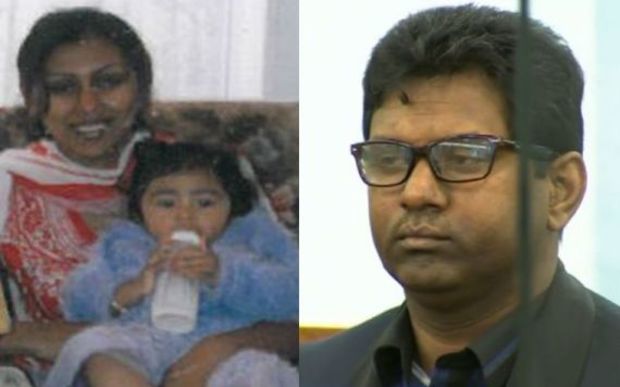A Fijian man who murdered his ex-girlfriend and her young daughter and buried them near an Auckland bus station has lost his battle against deportation.

Kamal Reddy is serving a life sentence for killing Pakeeza Yusuf and her daughter, Jojo. Photo: Supplied / NZ Police / TVNZ
The bodies were only discovered in 2014 – eight years after their deaths – when Kamal Reddy confessed to undercover police officers.
Reddy strangled Pakeeza Yusuf with the cord of an iron in 2006, and used a pillow to smother her daughter, Jojo, so that she could not tell others that her mother had died and who did it.
After the pair were reported missing, Reddy was targeted in an undercover cold-case operation that saw him recruited into a fake crime syndicate.
Reddy led officers, posing as criminals, to the bodies near Akoranga bus station on the North Shore.
He was sentenced to life in prison with a minimum non-parole period of 21 years in 2016 and the Court of Appeal dismissed an appeal against his conviction in February.
The 46-year-old will not be eligible for parole until 2036, but law changes mean his deportation appeal was heard now rather than when he is close to being released.
Deported for drink-driving, not double murders
The murders occurred months before the mechanic was granted residence in New Zealand as a skilled migrant.
The immigration and protection tribunal heard that meant he instead became liable for deportation because of drink-driving convictions in 2011 and 2012.
A request for the hearing to be adjourned, because he is filing a complex appeal against conviction to the Supreme Court, was rejected.
Reddy argued he should be allowed to stay in New Zealand because his adult son lives here, he was sorry for the driving offences and is still appealing his murder convictions.
But the tribunal concluded his circumstances, including the interests of his son, his financial and employment prospects and support in Fiji, were not exceptional circumstances of a humanitarian nature.
He will be deported upon his release from prison.
Child’s killing ‘act of particular callousness’
The murders happened after a couple he was living with separated and Reddy was charged with assaulting the husband with a weapon and threatening to kill the husband and his partner.
When Pakeeza Yusuf – who he denies was his girlfriend – did not appear at the District Court, the charges of threatening to kill her and her husband were withdrawn by the police.
Reddy was granted a discharge without conviction for the assault.
“Although it was not known at the time,” said the tribunal’s decision, “it later became apparent that the partner’s non-appearance was attributable to the fact that [Reddy] had murdered her and her child and buried them on a construction site.”
The tribunal read the sentencing judges notes: “The murder of [Jojo] was by your own admission committed in an attempt to avoid the murder of her mother, and your involvement in it, being detected.
“You did it to save your skin, or so you thought. It was an act of particular callousness. You were determined that nothing would lead to your apprehension, and the killing of a three-year-old child was something you were prepared to do to lessen the risk of apprehension of yourself.
“She was a sleeping three year old, and you deliberately extinguished her life.
“[…] your actions showed a high level of callousness in the cold way you went about the two murders, particularly the smothering of [Jojo].
“You were content to hold the bodies in your car for a day and a half. Ultimately, you consigned them to a burial where you were certain they would never be found, and indeed your calculation was right. They would never have been found but for the police undercover operation.”
The judge concluded it was “a double murder, a killing to avoid detection, a young vulnerable child victim and particular callousness. When your actions are examined … there are no mitigating circumstances.”







